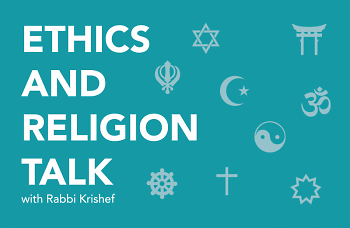Dahyabhai is curious about the places where a community worships. “What is the importance of a special house of worship? Is a house of worship mandatory? What are rules and requirements for someone to be allowed to enter a place of worship in your religion?”
We’re presenting the responses to Dahyabhai’s question in two parts. This week, we have responses from the non-Christian and Catholic panelists. Next week, we have three more Protestant responses.
My response:
Jewish communities believe that that it is preferable to pray in community rather than by oneself. Any space can be used for communal prayer. The synagogue developed as a focal point for Jewish communal life, to be a house of prayer, study, and communal meetings. There are no hard and fast rules for entering such a space, although it is customary in traditional synagogues for men, including visitors, to cover their heads in the worship spaces. Other garments of prayer, such as the tallit (prayer shawl) or tefillin (phylacteries), are typically reserved for Jewish men and women only. Non-Jewish visitors should not wear tallit or tefillin.
Fred Stella, the Pracharak (Outreach Minister) for the West Michigan Hindu Temple, responds:
Most Hindus would agree with Roman Catholics and Orthodox adherents that a house of worship is more than just a building. We do consider the temple sacred space. The various ceremonies we perform when dedicating a temple are extensive and take several days. This has the effect of impressing the idea that when we enter we are in a very special place that allows us a deeper connection with the divine. On the very deepest level we believe that the cosmos is a manifestation of the divine. From that point of view a temple isn’t any more “sacred” than the men’s room of a biker bar. However, most mortals are not as spiritually equipped to sense the presence of divinity in the latter as they would in the former.
Temples are usually open daily. Ceremonies take place most days, but much of the time the building is open to the public for quiet meditation and prayer. There is no compulsion to attend temple. Plenty of Hindus prefer to make their home the primary worship space. Most Hindus have a dedicated room for this. That said, many agree with the idea of balancing individual or family prayer with activities involving the greater community.
We at West Michigan Hindu Temple are happy to host anyone who wishes to visit. The only thing we ask is that shoes are removed in the vestibule. Of course, the same modesty of dress that one would exhibit at any church or synagogue is encouraged.
The Reverend Colleen Squires, minister at All Souls Community Church of West Michigan, a Unitarian Universalist Congregation, responds:
Unitarian Universalists are very flexible in terms of what defines a house of worship. There are no mandatory requirements for a space to be considered a house of worship other than it needs to be accessible as possible to all people. We have no rules or special requirements for a person/visitor to enter our worship space.
Father Kevin Niehoff, O.P., a Dominican priest who serves as Judicial Vicar, Diocese of Grand Rapids, responds:
The Catholic Church defines a church as ‘a sacred building intended for divine worship, to which the faithful have right of access for the exercise, especially the public exercise, of divine worship’ (1983 Code of Canon Law, canon 1214). There are numerous references to ‘church’ in the New Testament. First, and foremost, a church is the people of God (e.g., 1 Corinthians, Galatians, and Ephesians) and not a building or place of worship.
No, a house of worship is not mandatory. However, having a dignified place for a community of believers to gather and pray together is not necessarily inappropriate.
Anyone is welcome to any Catholic parish. If no one is present, you are welcome to respectfully walk around the church. Please avoid the altar platform, chairs on the altar platform, or movement near the reserved Blessed Sacrament. Always feel free to take time to pray and reflect in this holy place.
If people are present, follow their lead and be respectful of the worshippers. At communion time, please note that non-Catholics are not free to accept the Eucharist but if you follow the crowds in line for Holy Communion, you may fold your arms across your chest and receive a blessing.
This column answers questions of Ethics and Religion by submitting them to a multi-faith panel of spiritual leaders in the Grand Rapids area. We’d love to hear about the ordinary ethical questions that come up in the course of your day as well as any questions of religion that you’ve wondered about. Tell us how you resolved an ethical dilemma and see how members of the Ethics and Religion Talk panel would have handled the same situation. Please send your questions to [email protected].
The Rapidian, a program of the 501(c)3 nonprofit Community Media Center, relies on the community’s support to help cover the cost of training reporters and publishing content.
We need your help.
If each of our readers and content creators who values this community platform help support its creation and maintenance, The Rapidian can continue to educate and facilitate a conversation around issues for years to come.
Please support The Rapidian and make a contribution today.
